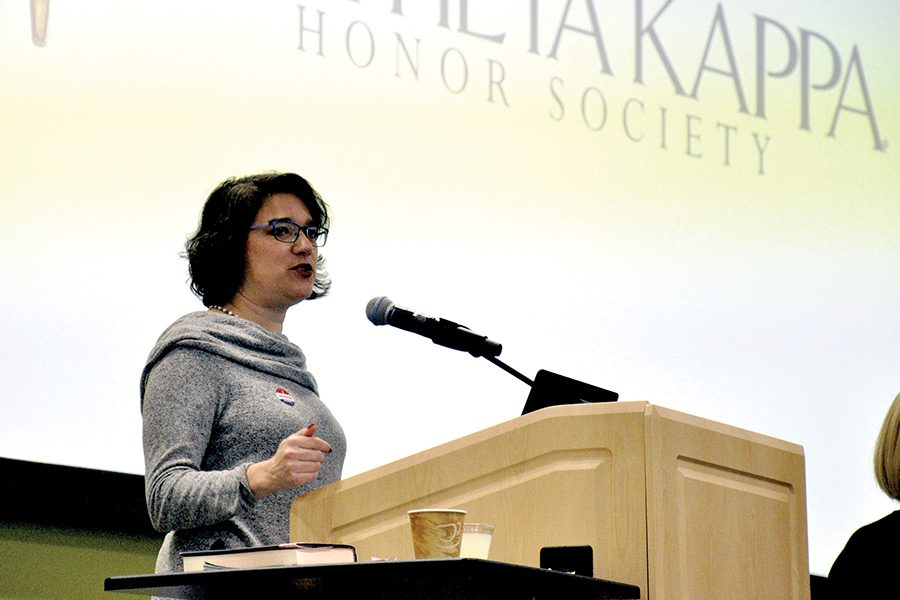Sargent speaks on the luxury item tax of menstrual products
State Rep. Melissa Sargent speaks recently at an event at Madison College that was sponsored by Phi Theta Kappa.
April 17, 2018
State Rep. Melissa Sargent believes that menstrual products should be free and accessible in all public bathrooms, including the ones at Madison College, because they are a basic public health need.
“No one is asking ‘how much does it cost?’ to be providing toilet paper or hand soap in the budgets for businesses, for non-profits, for branches of government, for educational institutions,” explained Sargent. “We are not having bake sales to pay for our toilet paper.”
Sargent was invited to speak at Madison College by Phi Theta Kappa (PTK), Student Senate, and WomenLEAD to discuss why everyone should care about accessible access to menstrual products in public restrooms.
“Even those of you who don’t menstruate for one reason or another, you should care very much about the fact that when you walk into a bathroom, all of your public health needs are addressed.”
Sargent began to advocate for free menstrual products after learning about other places that supply their citizens with them.
“About three years ago, I read an article about a country, and I can’t remember what country it was in the article, that provided free menstrual products in their bathrooms.”
Sargent was amazed by the accessibility of menstrual products in this country compared to the United States.
Sargent notes that the best it can get in most American bathrooms is access to a dispenser that asks for a quarter in order to receive a menstrual product.
“If I was to ask you all in this room who would have a quarter on them today, would you even have a quarter?” asked Sargent.
Sargent has heard stories first hand of how a lack of accessible menstrual products can have serious consequences.
“I was told stories from young people that are in high school in the City of Madison right now, about how their families couldn’t afford menstrual products,” said Sargent. “And on the days they would be menstruating, they just wouldn’t go to school. Our kids are mandated to go to school, and they wouldn’t go to school because we are not providing this basic hygiene product in our bathrooms.”
After hearing stories about women struggling without the menstrual products they need, Sargent began to ask herself questions.
“I started thinking as a policy maker, ‘What can I do, as a state representative, to help correct this? To help change this conversation?’”
This is when Sargent began to draft a piece of legislation that proposed that all public bathrooms in Wisconsin should be mandated to supply free menstrual products. Though the bill hasn’t been passed, just the proposal alone has inspired other public institutions to decide to supply menstrual products on their own.
Though free menstrual products are one way of addressing the issue of accessibility, Sargent also believes getting rid of taxation on menstrual products is equally important.
“In Wisconsin, bull semen isn’t taxed, gun club memberships are not taxed, Kit-Kat candy bars are not taxed, but tampons and pads are,” said Sargent.
“When you look up the purpose of a tax in our statutes, we are told that it is a way that we add a little revenue to the state for a luxury item. I have not met one person in my life who considers that a luxury,” said Sargent.
PTK found it important to take action because menstrual products at Madison College are inaccessible.
“There’s a lot of bathrooms that don’t offer the dispensing machines … and those that do, most of them don’t work, they cost money,” said Cat Larson, Phi Theta Kappa chapter president. “To my knowledge, a lot of the outlying campuses don’t even have the (dispensers) to offer.”
“In an ideal world, every bathroom, on every campus, would have free menstrual products,” said Larson.
Following Sargent’s visit, a group of students are now meeting together to discuss plans on making menstrual products more accessible.
The student group hopes that in the future, menstrual products will be accessible to all students at every campus of Madison College.
“I think it’s important to have menstrual equality everywhere, but I think Madison College is a good place to start,” said Larson.































